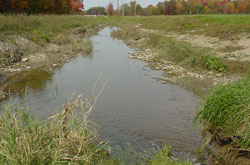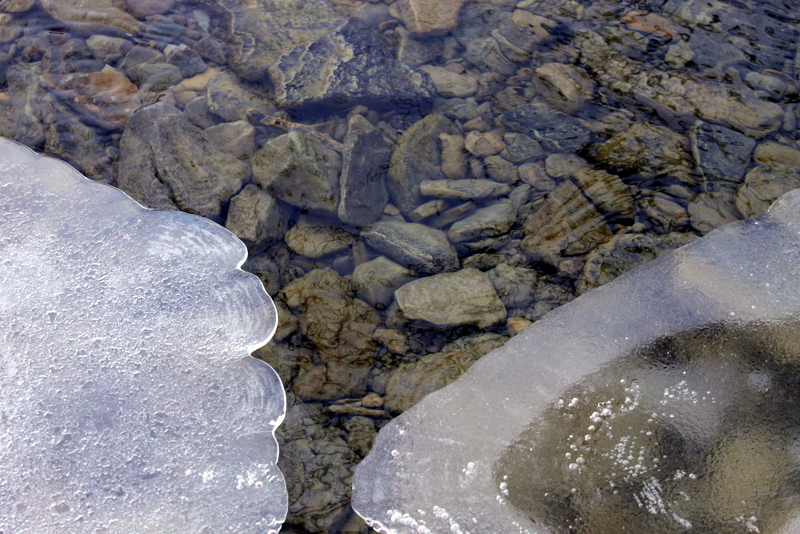Water Pollution Hits Home
By Lisa Flinn, Crawford County Conservation District Intern
 Water pollution is often linked to large industries with foul pipes secretly spewing waste into our waters. People normally don’t think of themselves as part of the pollution problem, but we are all responsible for polluted waters since sources of pollution come from our own homes and yards. From chemical drain “uncloggers” to chemical lawn feeders, we regularly use potent pollutants in and around our homes. Does this have an effect on the environment? Of course it does. Cars, for instance, hold many environmentally damaging chemicals like battery acid, transmission fluid, anti-freeze, and motor oil. These chemicals can easily run into storm drains, which do not filter its contents, and then drain into a local waterway. What can we do about it? Try recycling motor oil or finding out about battery recycling through your auto garage. Petro-chemicals from cars also build up on paved surfaces such as parking lots, driveways, and roads and can run off into waterways. Streams are unable to handle the sudden influx of toxins, affecting aquatic life and water quality.
Water pollution is often linked to large industries with foul pipes secretly spewing waste into our waters. People normally don’t think of themselves as part of the pollution problem, but we are all responsible for polluted waters since sources of pollution come from our own homes and yards. From chemical drain “uncloggers” to chemical lawn feeders, we regularly use potent pollutants in and around our homes. Does this have an effect on the environment? Of course it does. Cars, for instance, hold many environmentally damaging chemicals like battery acid, transmission fluid, anti-freeze, and motor oil. These chemicals can easily run into storm drains, which do not filter its contents, and then drain into a local waterway. What can we do about it? Try recycling motor oil or finding out about battery recycling through your auto garage. Petro-chemicals from cars also build up on paved surfaces such as parking lots, driveways, and roads and can run off into waterways. Streams are unable to handle the sudden influx of toxins, affecting aquatic life and water quality.
Because we’ve had so much snow and ice this winter, we’ve had an increased reliance on road salt. Sprinkling salt on sidewalks will prevent us from slipping, but where does the salt go after the snow melts? It goes into its local waterway, transported by rainwater. The salt can change the chemistry of the waterway, often having a detrimental effect on several organisms since the absence of one insect or fish can affect the entire food web. A good alternative to salt would be kitty litter. You may have to sweep it up after a snow melt, but at least your waterway will be healthy and it will not burn puppy paws like road salt will.
Similarly, other additives to waterways through run-off can affect water chemistry. Pesticides, herbicides, and fertilizers used excessively on lawns will eventually be washed into a local waterway. By testing soil or sending a soil sample away, a lawn-owner will know how much chemical fertilizer a lawn would require, if any. This saves money and prevents and over-application of fertilizer. Any fertilizer not taken up by plants will wash off in the first rain storm. Try collecting rain in rain barrels or allow the rain to fan or diffuse over your lawn instead of it shooting out of the rain gutter like a power hose. This way, storm drains will not be overloaded with lawn residue run off which goes directly into streams. Plus, if you use a rain barrel, you will have a free supply of water to water your garden with.
Everyone knows that pesticides and herbicides are bad for stream health. Instead of using herbicides, why not raise the blade on your lawn mower, so that your grass grows to three inches instead of one. This way, light will not be able to penetrate to the weed seeds in the soil, allowing for a natural herbicide. Also try to let your grass clippings lie. By doing so, you will have an immediate and free source of fertilizer. If the thought of leaving clippings on the lawn makes you a little uneasy and lawn-conscious, use a mulching mower. A mulching mower will mince fallen leaves and grass, and turn it into rich fertilizer for your lawn, saving you time and energy.
Composting provides a natural and convenient alternative to throwing away easily degraded materials. Having your own compost box or pile at home will allow you to dispose of fallen limbs, food waste, or dead leaves without having to “bag” them. This may reduce your sanitation bill and provide you with a free source of fertilizer to help your garden grow. For more information on composting:
- Northwest Region of the Department of Environmental Protection (DEP) in Meadville
814-332-6945 · Guy McUmber - Crawford Conservation District
814-763-5269 · Tracey Crawford - Crawford County Solid Waste Authority
- Cooperative Extension Office

